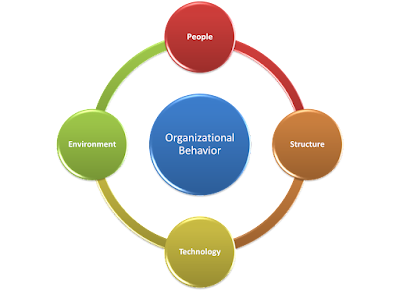What is Organizational Behaviour?
Organizational behavior is a practical branch of behavior science that deals with the behavior of people working in an organization.
 |
| Organizational Behavior |
According to Keith Davis, "Organizational behavior is the study and application of knowledge about human behavior in organizations as it relates to other system elements, such as structure, technology, and the external social system."
According to Larry L. Cummings, "Organizational behavior is a way of thinking, a way of conceiving problems and articulating research and action solution."
Organization behavior refers to the way people behave in groups. It is about how individuals interact with each other and what happens between them. In addition to the individual, organizational behavior includes many factors such as:
- Culture
- Values
- Beliefs
- Attitudes
- Norms
- Ethics
- Communication
- Leadership styles
- Decision-making
- Power
- Politics, and
- Structure.
1. Organizational Culture
Culture is the set of shared customs and traditions of an organization. Culture determines the behaviors and actions of employees within an organization. Culture is defined by the values, beliefs, attitudes, and norms held by members of the organization. A person’s culture influences their decisions, values, behaviors, and interactions with others. People who belong to different cultures may have conflicting goals and expectations.
2. Values
Values are beliefs that guide our daily lives. We value things like honesty, integrity, respect, trustworthiness, loyalty, responsibility, fairness, etc. These values influence our choices and behaviors. Values are often shaped by family, friends, religion, community, and society.
3. Beliefs
Beliefs are ideas we hold about ourselves and the world around us. Most beliefs are formed early in childhood. As we develop, we build upon these beliefs and learn new ones. Our beliefs shape our thoughts, feelings, and behaviors.
4. Attitudes
Attitude is a general term for the way someone feels about something. An attitude is a belief about yourself and the world around you. You may have positive or negative attitudes toward certain topics.
5. Norms
Norms are rules that govern social behavior. There are two types of norms: informal and formal. Informal norms are unwritten rules that govern social behavior, while formal norms are written down and enforced.
6. Ethics
Ethics are moral principles or standards that determine right and wrong. Ethical behavior is based on morals and values.
Read More: